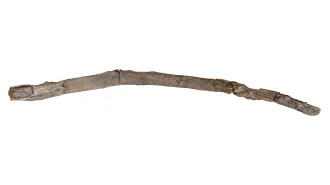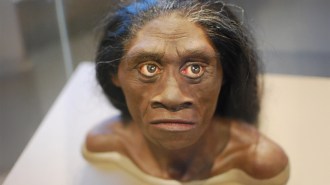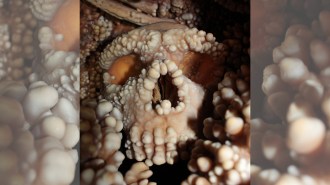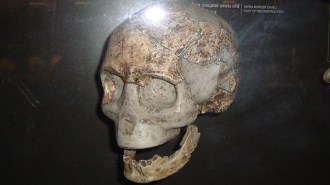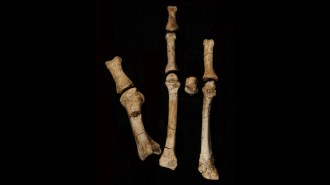Neandertals show ancient signs of caring
A nearly toothless jawbone found last year in France, which represents an early form of the Neandertals, speaks volumes about the ancient roots of providing life-saving care for the injured and infirm, according to a new report.

The partial jaw, dated at between about 169,000 and 191,000 years old, contains extensive bone damage and loss. It belonged to an adult who survived for at least 6 months while being virtually unable to chew food, concludes archaeologist Serge Lebel of the University of Quebec in Montreal and his colleagues.
Survival for this prehistoric individual required the caring efforts of his or her fellow Neandertals, Lebel’s group concludes in a paper slated to appear in the Proceedings of the National Academy of Sciences. The new find pushes back by more than 100,000 years evidence for caregiving by a Homo species.
The French fossil jaw shows that, beginning deep in prehistory, Neandertals exhibited a humanlike propensity to aid their debilitated comrades, says anthropologist Erik Trinkaus of Washington University in St. Louis, a coauthor of the paper. “This was probably a widespread social behavior among Neandertals and other ancient Homo species as well,” Trinkaus asserts.
At the French site, Neandertal caregivers may have saved fruits and other soft foods for their toothless peer, the scientists speculate. It’s also possible that family members or friends pounded, chopped, or cooked tougher food so that it could be eaten without chewing.
Earlier excavations have yielded evidence of Neandertal caregiving at several European and western Asian sites dating to around 50,000 years ago. For instance, extensive arthritic damage on a Neandertal skeleton found at Shanidar in Iraq indicates that this individual was sustained by others’ help.
The diseased jaw and 10 isolated Neandertal teeth were found in southeastern France at a rock shelter called the Bau de l’Aubesier. It doesn’t appear that any of the unearthed teeth came from the fossil jaw, the researchers say.
Lebel’s team dated their discoveries by using a laboratory technique to measure stored energy in six pieces of burned flint found near the fossils.
The jaw displays Neandertal characteristics such as a slanting orientation, which would have supported a jutting lower face. No intact tooth remains in the fossil. Two partial teeth show signs of traumatic breakage, Trinkaus says. Extensive bone wear and erosion appear throughout the jaw.
Initial tooth loss probably exposed the Neandertal individual’s gums, and then gum infections and bone disease developed, Trinkaus theorizes. A face injury of some kind could also have caused tooth loss and gum damage, he adds.
“It’s clear that it was very hard for this individual to chew and that the condition lasted for some time,” comments anthropologist Christopher B.
Stringer of the British Museum in London. “Others must have provisioned for this person in some way.” The new evidence doesn’t resolve the debate over Neandertals’ place in human evolution, he adds.
Stringer suspects that the earliest examples of caregiving behavior occurred among the common ancestor of Neandertals and modern humans, which lived approximately 400,000 years ago.


